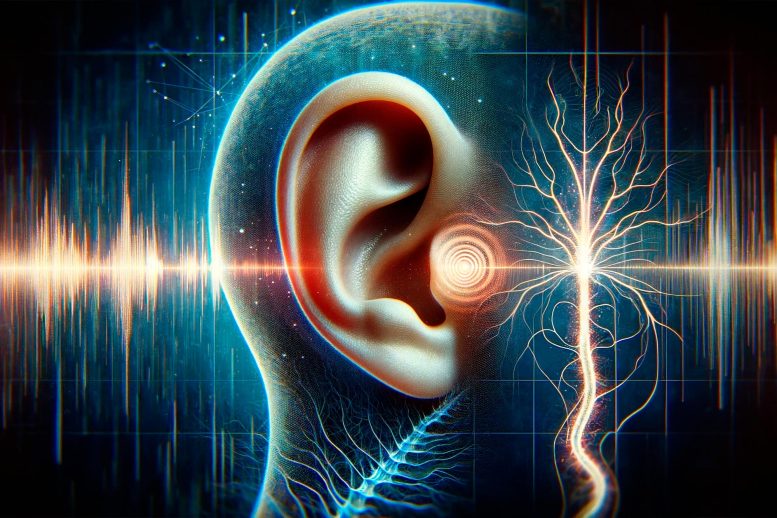Tinnitus Linked to Hidden Undetected Auditory Nerve Damage – A Step Towards a Cure

Researchers at Mass Eye and Ear have linked tinnitus, a condition affecting over 10% of adults worldwide, to undetectable auditory nerve loss. Their study suggests that even individuals with normal hearing tests can suffer from this hidden hearing loss, paving the way for new treatments focused on nerve regeneration.
A groundbreaking study by Mass Eye and Ear associates tinnitus with undetected auditory nerve damage, challenging previous beliefs and opening new paths for treatment through auditory nerve regeneration.
A new study from Mass Eye and Ear investigators reveals that people who report tinnitus, which presents as a ringing in the ears in more than one out of ten adults worldwide, are experiencing auditory nerve loss that is not picked up by conventional hearing tests. This work is part of a P50 grant awarded by the 
Stéphane F. Maison, PhD, CCC-A, an investigator at Mass Eye and Ear’s Eaton-Peabody Laboratories, and clinical director of the Tinnitus Center at Mass Eye and Ear. Credit: Mass Eye and Ear
Many individuals with hearing loss report a buzzing, humming, ringing, or even roaring sound in their ears. It’s been a longstanding idea that these symptoms, known as tinnitus, arise as a result of a maladaptive plasticity of the brain. In other words, the brain tries to compensate for the loss of hearing by increasing its activity, resulting in the perception of a phantom sound, tinnitus. Until recently though, this idea was disputed as some tinnitus sufferers have normal hearing tests.
However, the discovery of cochlear synaptopathy back in 2009 by Mass Eye and Ear investigators brought back to life this hypothesis as it was evidenced that patients with a normal hearing test can have a significant loss to the auditory nerve. In view of this paradigm shift in the way researchers and clinicians think about hearing loss, Maison and his team sought to determine if such hidden damage could be associated with the tinnitus symptoms experienced by a cohort of normal hearing participants. By measuring the response of their auditory nerve and brainstem, the researchers found that chronic tinnitus was not only associated with a loss of auditory nerve but that participants showed hyperactivity in the brainstem.
Towards a Potential Cure for Tinnitus
“Our work reconciles the idea that tinnitus may be triggered by a loss of auditory nerve, including in people with normal hearing,” said Maison.
In terms of future directions, the investigators aim to capitalize on recent work geared toward the regeneration of auditory nerve via the use of drugs called neurotrophins.
“The idea that one day, researchers might be able to bring back the missing sound to the brain and, perhaps, reduce its hyperactivity in conjunction with retraining, definitely brings the hope of a cure closer to reality,” Maison added.
Reference: “Evidence of cochlear neural degeneration in normal-hearing subjects with tinnitus” by Vasilkov, V et al., 30 November 2023, Scientific Reports.
DOI: 10.1038/s41598-023-46741-5
Funding: This work was supported by a grant from the NIDCD (P50 DC015857) and the Lauer Tinnitus Research Center at the Mass Eye and Ear.
Read More:Tinnitus Linked to Hidden Undetected Auditory Nerve Damage – A Step Towards a Cure
